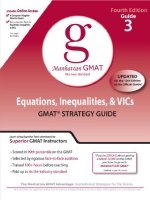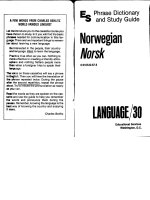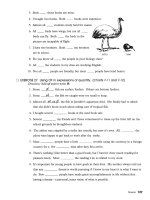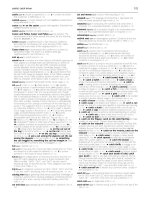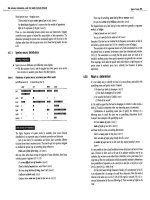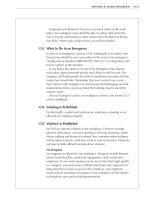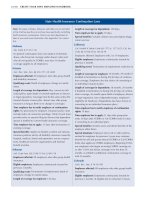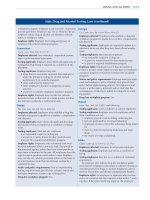Sixth-Form-Prospectus-and-Course-Guide-2019-21-web
Bạn đang xem bản rút gọn của tài liệu. Xem và tải ngay bản đầy đủ của tài liệu tại đây (3.91 MB, 32 trang )
Sixth Form
Prospectus
and
Course
Guide
2019 - 2021
Education in the Truth for Life and Eternity
Contents
Principal’s Welcome
All Courses on Offer
Ready...
for Study?
to Develop?
to be Creative?
to be Active?
for Growth?
to Make a Difference?
for Lifelong Friendships?
to be Involved?
for Advice?
to Find Out More?
Overview
How to Choose the Correct Courses For You
Pastoral Support
Preparation for Life Beyond the Sixth Form
Enrichment and Community Action Week
Bespoke Curriculum
Entry Requirements
Course-By-Course Details
GCSE Maths and English
How to Apply
Page
1
2
3
4
5
6
7
8
9
10
11
12
13
13
14
14
15
16
17-27
28
29
Principal’s welcome
Dear parents and students,
This means the freedom to balance study with music,
drama, sport, community service, publications, work
experience and sharing the care of younger students
with the staff team. Whether planning for work, training,
university or just life itself, these are the things which
help you to grow as well-rounded young men and
women of fine character and which best prepare you for
whatever lies ahead.
In my experience, life in a school Sixth Form is regarded
by most young people as the best days of their lives.
This is particularly true here at The King's Academy.
After the years of hard work leading up to GCSEs, a
school's Sixth Form offers you the unique opportunity
of preparing for adult life, whilst still being able to take
advantage of the personal, community, social and
cultural opportunities which only a school can offer. For
those aspiring towards university, The King's Academy
provides the very latest facilities for study in small class
sizes alongside increased freedom for personal study
but with outstanding support from your teachers
whenever you need it. The support mechanisms of
individual tutors, pastoral care and well-known daily
routines provide a highly supportive framework in
preparation for you to take your next life step with
assuredness.
As you read these few pages, we want to offer you the
opportunity of studying in the best and most modern
facilities in the area, safe in the knowledge that we have
the experience and expertise to help you best bridge
these important years between youth and adulthood.
We provide leadership opportunities where the eldest
students lead the younger years through, for instance,
prefectship, house captaincy, the reading mentor
scheme, sports coaching and, most of all, by personal
example. By creating this balance between personal
security and increased freedom, Sixth Formers at The
King's Academy are able to take on more responsibility
for their future success, whilst still having strong
support systems in place for when they need them.
Mr David Dawes
Principal
August 2019
1
All courses on offer
Please note that you can find more information about each course in the
Course-by-course details section from page 17 onwards.
A Level (usually 5x50 minute lessons weekly)
A levels are academic courses. They prepare you for university entry or for higher apprenticeships. Most
students will choose to study three subjects in Year 12, continuing with three in Year 13 to full A-level standard.
Subjects offered are:
Art and Design (Fine Art)
Art and Design (Textiles)
Biology
Business Studies
Chemistry
Computing
Drama and Theatre Studies
Economics
English Language
English Literature
English Language and Literature
Extended Project Qualification
French
Geography
German
Government and Politics
History
Mathematics
Further Mathematics
Physical Education
Physics
Product Design (Engineering)
Psychology
Religious Studies
Sociology
Vocational Courses (2, 5 or 10x50 minute sessions weekly)
Vocational courses offer an alternative to the traditional academic A Level and are of equivalent points value.
Learning is assessed by way of case studies and reports, although there are also written examinations. The range
of vocational and organisational skills the student develops from these courses are highly prized by many
universities. The King’s Academy offers the following vocational courses:
Subject
Qualification (and A-level Equivalence)
Business
BTEC Level 3 Extended Certificate or Full Diploma (one or two A-levels)
Health and Social Care
BTEC Level 3 Extended Certificate or Full Diploma (one or two A-levels)
Food Science and Nutrition
Level 3 Technical Diploma (one A level)
Information Technology
(Application Developer)
Level 3 Cambridge Introductory Technical Diploma (one A-level)
Applied Science
Level 3 Extended Certificate (one A-level)
Music Performance
RSL Level 3 Subsidiary Diploma for Music Practitioners
(Performance pathway) (1.5 A-levels)
Music Technology
RSL Level 3 Subsidiary Diploma for Music Practitioners
(Technology pathway) (1.5 A-levels)
Mathematics
Level 3 Applied General Qualification (AS-level)
2
Ready for study?
Academic curriculum
Directed study time
Excellent teaching staff strive for high academic
standards and a first-class work ethic, helping each
student to achieve their personal best.
Directed study time allows you to carry out research,
undertake wider reading and prepare coursework in a
quiet working environment. The Sixth Form study centre
offers plentiful computer facilities and permanent
internet access.
From the time of your application to The King’s Academy,
the Head of Sixth Form and a team of tutors will work in
partnership with you to create a programme that will offer
you the best in Sixth Form education.
IT facilities
The Academy’s IT facilities are state-of-the-art and the
equal of those found in any other school or college in the
country. Features include:
Our aim is to ensure that you choose the right
combination of courses that will best prepare you
for entry to further or higher education and for the
opportunities offered by your future career.
• WiFi access for students
• Over 400 work stations
Following your application, the discussion of the courses
which best meet your preferences, needs and aspirations
will begin with an informal interview. Further advice will
then be available throughout the Spring and Summer
terms and during the week following your GCSE exam
results.
• Microsoft Windows and Office on all computers
• Printers in every IT room and in the library for Sixth Form use
• Digital video provision across the network
• Personal secure disk space for each student
We offer a range of traditional A Level courses and
Level 3 Vocational Diplomas and Certificates. Students’
progress is reviewed on a regular basis with their tutor.
• Data projectors in every classroom
The Sixth Form study centre has its own suite of computers
solely for use by Sixth Formers.
3
Ready to
develop?
Sixth Form lectures
Regular Sixth Form lectures are held in the impressive
270 seat interactive lecture theatre and cover a variety of
useful topics such as:
•
•
•
•
•
•
•
•
Study skills
Revision strategies
Choosing the right university
Completing your UCAS form
Preparing your CV
Interview technique
Financing higher education
Cooking your first university meal!
Guest speakers including university admissions officers
and independent careers advisers are also invited to give
lectures.
Philosophy, Theology and Ethics (PTE)
Sixth Form students follow a structured programme of
PTE (Philosophy, Theology and Ethics) throughout their
two years of study. The PTE course is an excellent
complement to a student's academic studies, regardless
of which university course and future career they have in
mind. It seeks to develop logical thought, ethical debate
and the mature exchange of ideas on subjects which are
often controversial.
“Very good guidance is provided
for Year 12 and 13 students when they
are planning what to do next.
As a result, all students are very
well prepared to make choices for
the next stage of their life.”
Ofsted, 2013
4
Ready to be
creative?
Music and Drama
Both music and drama play an important part in Academy
life. Sixth Form students can be as creative as their
imaginations will allow:
• Music composition software on a dedicated suite
of computers
• Instrument practice rooms
• Individual tuition for musical instruments
• Drama studio
• Events hall with a performance stage and
computerised lighting/sound system.
The Music and Drama departments between them present
an exciting programme of events throughout the year:
•
•
•
•
•
•
•
The annual Academy Production
The annual Carol Service
The Performing Arts Festival
The Summer Music Evening
Plays
Recitals
Ensembles
“Progress and achievement in Years
12 and 13 is good and continues to
improve year on year. In advanced level
physics, art and design, textiles, history,
English literature, drama and product
design students exceed the standard
expected of them.”
Ofsted, 2013
5
Ready to
be active?
Sports and recreation
All students are encouraged to make full use of the
Academy’s outstanding sports and recreation facilities:
• Full-size sports hall for basketball, netball,
volleyball, badminton and 5-a-side
• Full-size floodlit astroturf for football and hockey
• Extensive playing fields for football, rugby,
cricket and athletics
• Five tennis courts
• Dance and aerobics studio
• State-of-the-art fitness gym with a range of
cardio-vascular exercise machines.
A large number of sports teams hold practices after
academic lessons each day.
Trips
Sixth Form offers students a variety of trips. Typical trips
have included:
•
•
•
•
•
•
Ice skating
White water rafting
Christmas shopping
Karting
Theatre and cinema
Cultural trips to London, Paris, Barcelona,
Rome and Strasbourg.
• The Texas Football Tour and the Hockey and Netball
Tour to Barcelona.
6
Ready for growth?
Enrichment and Work Experience
On Wednesday afternoons, normal lessons stop and
all Sixth Form students take part in an Enrichment
activity of their choice. Up to fifteen choices are on
offer, including:
• Arts and crafts
• Braille
• Combined Cadet Force (CCF)
• Department assistants
• Extended Project Qualification (EPQ)
• Film Club
• Football
• Massive Open Online Courses (MOOCs)
• Yoga
Many students also attend our hugely popular
speaker programme; recent guests have included a
baroness from The House of Lords, human rights
workers, a survivor of human trafficking and university
academics in fields ranging from the Middle East to
women’s rights.
We also support students to take up work experience
and volunteering during Enrichment, with many
students finding places in James Cook hospital,
primary schools and at care homes, among others.
7
Ready to
make a
difference?
Charity work
Each year, with support from the Emmanuel Schools
Foundation, groups of Sixth Formers visit developing
countries such as Uganda, South Africa and Mexico,
taking part in outreach activities alongside students from
our sister schools.
Sixth Form students are also very active in raising funds for
the Academy’s charities.
Christian ethos
The Academy follows the principles of the Christian faith.
All students are encouraged to explore a wide range of
spiritual, moral and ethical issues and to come to their
own decisions about what they believe.
Community action
As part of your Sixth Form experience, you will have
the opportunity to spend a week giving something back
to your local community.
Leadership roles
In recent years, students have worked with local youth
groups, cared for animals at the RSPCA, worked in primary
schools and much more. This is a fantastic opportunity
that is fulfilling and adds valuable experience to your CV
or UCAS personal statement.
We believe that true leaders are those ready to serve
others. The chance to be Head Boy or Girl, a senior
prefect, a reading mentor, a subject assistant or to help
in the Junior Academy are just some of the huge range
of leadership and service opportunities on offer - there
is something for everyone willing and able to try. These
opportunities bring our students a sense of fulfilment
and a chance to show employers and universities what
you can do on your CV or UCAS personal statement.
Royal Marines CCF
The CCF offers an exceptional range of activities to help
you gain new skills, improve your teamwork, confidence
and leadership. As well as fieldcraft, drill, first aid,
weapons handling and live firing, these can include
paddlesports, mountain biking, mountain walking, rock
climbing and scuba diving
8
Ready for
lifelong
friendships?
Enjoying greater independence
Experiences to share with friends
The Sixth Form Common Room is a relaxing place for
students to take a break, enjoy a cup of coffee and talk
with friends or work in small groups. Sixth Form students
also enjoy privileges that the rest of the school does
not, like the freedom to spend lunch and break-times off
site (with McDonalds and the nearby shops and
takeaways of The Parkway Centre within easy reach!).
Sixth Form experiences like our recent Christmas
markets trip, the Oxford University trip or the visit to
Cafe Scientifique in Newcastle help to ensure that these
really are some of the most memorable years of your
life.
“You feel joy in places where you thought was none. You come together with new people
and see what you have achieved. You can change a life, say you have a place in this world
and if nothing else you know you’ve done something good.”
-
Fay Loughran, who helped build a new home for a family in the “Rebuild
Mexico” trip
9
Ready to be
involved?
The Academy day
Tutor groups and the house system
Members of the Sixth Form start their Academy day at
8.30am and end at 3.40pm (2.50pm Fridays). Except for
lunch, students remain on the Academy premises between
those times for a mixed programme of lessons, study time
and recreation.
Each student is placed in a tutor group, which meets twice
a day. The tutor closely monitors the progress of each
tutee, and provides guidance, help and supports welfare
whenever necessary. Each student is also a member of one
of four Houses and is encouraged to compete in a range of
inter-house competitions throughout the year.
Academy Business Suit
Students requiring wheelchair access
The King’s Academy expects a high standard of appearance
from all of its students.
The Academy building caters well for the wheelchair user
with its wide corridors, dual leaf access doors and lifts.
We believe that every student should be dressed smartly
and take pride in how they look. Each member of the Sixth
Form wears the smart and distinctive Sixth Form business
suit, similar to those shown throughout this prospectus.
Resourced Provision for Sensory Impairment
Within our Sixth Form, we have the provision to support
students who are Deaf/Hearing Impaired (DHI) and students
with a Visual Impairment (VI). Our DHI resource provision at
Sixth Form enables our students to work independently, with
assistance from communication support, note taking and
tutorials, if required. Our VI resource provision offers access
to the curriculum via transcription (braille and modified print)
and assistive technology
Meals
Academy meals are provided in two restaurants, where a
wide range of quality hot and cold food is available. Each
student pays for their meals with an electronic identifier
that can be credited daily, weekly or monthly.
10
Ready for
advice?
Careers advice
Individual attention
The Sixth Form leadership team and the team of tutors
provide specialist careers advice to each student in the
Sixth Form. Weekly careers lessons bring in a range of
outstanding guest speakers with tips on choosing the
right university, apprenticeship or job. The Sixth Form
careers library provides a wealth of books, prospectuses
and on-line guides to assist students with their choice of
institution and course.
With over a hundred universities and colleges in the UK,
and thousands of degree and other HE courses to choose
from, the path into higher education can be a difficult
one to navigate. Personal progress interviews are held
with each student every term throughout their two years
of study. Tutors meet with you to discuss what course,
university or job are right for you. They also discuss your
academic progress, help you to get support when you
need it and advise you on how to take those vital steps
to reaching your goals for life after Sixth Form.
Expertise
Preparation for work
As the demand for university places continues to rise,
applications to higher education institutions become
ever more competitive. Our expert team offers detailed
guidance on how to write outstanding personal
statements and how to maximise your chance of success
through wider reading, work experience or volunteering.
Our UCAS staff are trained in writing references that
really bring out your achievements.
Some students will choose to seek employment on
leaving Sixth Form rather than go on to university or
college. The Academy will assist each student in gaining
meaningful employment and has fostered links with local
businesses and national organisations to help students
gain short-term and long-term work placements, both
within the local region and beyond.
“All students successfully make
progress to the next stage of education,
employment or training”
Ofsted, 2013
11
Ready to
find out more?
Why choose the Sixth Form at The
King’s Academy?
Catchment area and admissions
The King’s Academy will consider applications from
students living both locally and further afield. For the
Sixth Form, there is no defined catchment area for
enrolment. Students from all over the area are welcome
to apply for a place, who satisfy the requirements for entry
to their chosen course and to the Sixth Form. This includes
acceptable records of behaviour and attendance that ensure
all students benefit from a King’s Sixth Form experience.
There are many school and college Sixth Forms in the
Middlesbrough area, so why choose The King’s Academy?
• We provide excellent teaching that challenges
students to think deeply and achieve their best.
• Each student receives individualised and
continuous careers advice.
• Facilities are modern, hi-tech and amongst the best
in the country.
Location
• Students can participate in a wide variety of
sporting and extra-curricular activities.
The Academy is located on the outskirts of
Middlesbrough in the suburb of Coulby Newham and is
easily accessible by car, bus or on foot.
• We provide unique leadership opportunities
such as prefectship and house captaincy.
Approximate journey times:
• 10-15 minutes from Middlesbrough Town Centre
and Ingleby Barwick.
• Students are fully supported to seek a huge range of
community service or work experience opportunities.
• 15-20 minutes from Yarm, Eaglescliffe, Eston,
Guisborough, North Ormesby, Stockton.
• Pastoral care, advice and support are given to
every individual.
• We tailor each student’s academic curriculum to
suit their own abilities and preferences.
• Class sizes are typically small.
• Directed study time and superb one-to-one help
are provided to support students with their learning.
12
Overview
How To Choose The Correct Courses For You
The process of choosing A Levels or vocational qualifications is an important one as this is the start
of your journey to your chosen future career. We would like to make sure that the flight path you
choose at The King’s Academy Sixth Form creates the correct foundation for whatever you are aiming
to do. Therefore, please use the guide below to help you make an informed decision about your
subject choices.
STEP 1
What subjects do you enjoy? What are you good at?
STEP 2
Do you know whether you want to go to university, an apprenticeship, or into work after the
Sixth Form? Maybe you even know which career you would like. When thinking about careers,
ask yourself: what difference do you want to make in the world?
STEP 3
University
Apprenticeship
If it looks like university is the best way
forward, speak to a member of our UCAS team
to see which A-level and other Level 3 courses
might be best.
Read ‘Informed Choices’ by the Russell Group
If an apprenticeship or employment is for you,
then our careers advisors will also be able
to give you advice on Level 3 qualifications.
STEP 4
Choose three appropriate A-level/Level 3 courses, ensuring these are at the right level for you
based upon your predicted GCSE profile.
Pastoral Support
On joining the Sixth Form, you will be placed in a tutor group. Your tutor is the first source of
support for you but other key members of the pastoral staff are the Head of Sixth Form and the
Assistant Head of Sixth Form. Together, they form an experienced team who will guide you through
your time in the Sixth Form.
13
Overview
Preparation for Life Beyond the Sixth Form
The King’s Academy provides extensive support in guiding students through the important choices
they need to make post-16, whether they wish to go to university, apprenticeship or employment.
This support includes weekly careers lessons, guest speakers from universities and apprenticeship
programmes, work experience opportunities and meetings with students. Experienced staff who
know the students well will support the students throughout the university application process
offering advice on everything from choice of subjects and institutions to writing their personal
statement. Our Sixth Form leaders also organise special talks and support for those students aiming
for Russell Group universities, including Oxford and Cambridge.
Enrichment and Community Action Week
At The King’s Academy, we believe it is essential to help our students develop into fully rounded
citizens who have much to offer society. Wednesday afternoons are therefore devoted to
enrichment. Students can choose to participate in a range of activities. Traditional sporting
activities are also available with the opportunity to represent the Academy in competitive sports.
Opportunities exist for other activities such as peer mentoring, supporting younger students in their
lessons or helping with the Reciprocal Reading Scheme. The “Above and Beyond” speakers
programme has included renowned, thought provoking speaker on prison reform, international
human rights and, thanks to Baroness Tanni Grey-Thompson, an insider’s view of the House of Lords.
Community Action Week takes place in June. Students spend a week working in a huge range of
charitable establishments like care homes, The Unicorn Centre or the local primary schools.
Feedback from these establishments is invariably positive and our students gain a great deal by
giving something back to their community.
Student comments on Community Action Week:
It was brilliant. There was so much to do at one time, and I learned you have to be very
patient. They asked me to come back after study leave next year.”
I got Achiever of the Week! It’s made me realise that I would like to go down the teaching
route. I loved working with the children. The headteacher said I could have a placement
there next year.”
Comment from a local primary school:
The King’s Academy students who came to us for Community Action Week were polite,
helpful and respectful and all were wonderful examples of young people today. Everyone
who came into contact with them said the same thing - they did everything we asked with
enthusiasm and a positive attitude. They were a credit to you.”
14
Overview
Bespoke Curriculum
From the time of your application to The King’s Academy, the Sixth Form leadership team and a team
of tutors will work in partnership with you to create a programme that will offer you the best in Sixth
Form education.
Our aim is to ensure that you choose the right combination of courses that will best prepare you for
entry to apprenticeship or higher education and for the opportunities offered by your future career.
Following your application, our discussion of the courses which best meet your preferences, needs
and aspirations will begin with an informal interview. Further advice will then be available
throughout the spring and summer terms and during the week following your GCSE exam results.
Student comment:
The Sixth Form here offers so much support throughout your studies. The opportunities
are second to none and the relationships I have built with my peers have made these
years the best times of my life in education.”
Please note that although this guide reflects our courses at the time of publication, as in all schools
and colleges, course offerings may be changed from time to time.
15
Entry Requirements
Entry Requirements
Like most schools and colleges we require students to have achieved certain grades at GCSE before they can
study a subject at post-16. Students joining our Sixth Form must also have a good record of behaviour and
attendance at their school. This is to ensure that you are ready for A-levels or vocational qualifications and
that you have the tools you need to enjoy them and do well.
The first step is to add up the points from your 7 best GCSEs.
The table below tells you what subject combinations you can take at The King’s Academy:
Number of Points
Subject Combinations You Can Take
39
Three A levels
36
A vocational course plus two A levels
32
A vocational course plus one A level
28
Vocational courses
Students should also have at least grade 4 in Maths and English Language or Literature, but where they only
have a ‘3’ we can provide a re-sit programme in either English or Maths (but not both).
For example, a student with GCSE grades of 5 in English Language and 7 in Maths, plus two 7’s in Science, 6’s
in History, Geography and French and 3’s in RE and Drama has 44 points on their seven best GCSE results and
has met the entry requirements for three A-levels.
Most subjects also have additional subject specific requirements (see course descriptions on the following
pages).
It is important to remember, however, that we consider each application on a case by case basis. If you have
just missed the number of points you need to take certain subjects, we often consult your GCSE teachers, even
if you came to us from another school, to determine whether you would do well in the course you want to take
and therefore should take it regardless of narrowly missing out on the points. We look at the full pattern of
grades for individuals, and all admissions to courses are ultimately at the Principal’s discretion.
16
Courses
Course-by-course details
Art and Design (Fine Art)
A-level
Entry requirements
Grade 6 in GCSE Fine Art or Art and Design
Content
Painting and Drawing
Print Making
Photography and Digital Imaging
Sculpture
Ceramics
Portraiture
Assessment
40% examination
60% coursework
Prospects
Careers in fine art, textiles, photography, print-making, sculpture, illustration,
animation, graphic design, fashion design, architecture or other design industry
work.
Art & Design (Textiles)
A-level
Entry requirements
Grade 6 in an Art-based subject, preferably Art and Design: Textiles.
Students without this baseline knowledge may be considered on merit.
Content
Personal research through thread work, drawings, designs, critical analysis and
varied construction techniques and skills, alongside fashion/garment making.
Knowledge of the work of artists and designers through critical and contextual
studies. Use of textile and design media, such as Photoshop CS5 and Adobe
Illustrator. Units are tailored to meet individual creative requirements.
Assessment
40% examination
60% coursework
Prospects
Careers in fashion journalism, fashion communication, fashion design and
marking, costume and theatre design, product design, surface design, textile
construction, teaching and other design industry work.
Biology
A-level
Entry requirements
Grade 6 in two GCSE Sciences and a grade 6 in Mathematics.
Content
Foundations in Biology
Exchange and Transport
Biodiversity, Evolution and Disease
Communication, Homeostasis and Energy
Genetics, Evolution and Ecosystems
Assessment
100% examination
A practical endorsement is also awarded after the successful completion of a
number of set experiments and investigations.
Prospects
Careers in medicine, veterinary science, biology, biological research, sports
science, pharmacology, health care and agriculture.
17
Courses
Business Studies
A-level
Entry requirements
Grade 5 in Mathematics and 5 in English Language or Literature.
Content
What is business?
Managers, Leadership and Decision Making
Decision making to improve marketing, operational and human resource
performance
Analysing strategic position
Choosing strategic direction
Strategic methods
Managing strategic change
Assessment
100% examination
Prospects
Careers in marketing, human resources, business management, accountancy,
financial management, sales, market research, administration and retail.
Business (Extended Certificate or Diploma)
BTEC Diploma
Entry requirements
28 points at GCSE
Content
Exploring Business, Event Management, Personal Business Finance, Developing a
Marketing Campaign, Principles of Management, International Business
Assessment
Approximately 45% external assessment with the remainder as portfolio work
Prospects
Careers in marketing, human resources, business management, accountancy,
teaching, sales, market research, administration, retailing and public relations.
Chemistry
A-level
Entry requirements
Grade 6 in two GCSE Sciences and a grade 6 in Mathematics.
Content
Development of practical skills in chemistry
Foundations in chemistry
Periodic table and energy
Core organic chemistry
Physical chemistry and transition elements
Organic chemistry and analysis
Assessment
100% examination (3 exams)
A practical endorsement is also awarded after the successful completion of a
number of set experiments and investigations.
Prospects
Careers in scientific research, engineering, medicine, veterinary science,
dentistry, nursing, pharmaceuticals, food technology, patent law, forensics.
18
Courses
Computer Science
A-level
Entry requirements
Grade 6 in Mathematics.
Content
Computing Principles
Algorithm and Problem Solving
Computer Systems
Programming Project
Assessment
80% examination
20% controlled assessment
Prospects
Careers in Computer Science, Software Development, Network Manager, Games
Developer, Web Designer, Systems Developer, IT Consultant, Database
Administrator and Multimedia Programmer.
Drama and Theatre Studies
A-level
Entry requirements
Grade 5 in English Language or Literature.
Content
Create, perform and respond to drama and theatre.
Develop the creativity and independence to become effective theatre makers.
Explore the relationship between theory and practice in a range of
theatrical styles and periods and historical, social and cultural contexts.
Learn how relevant research, independent thought and analysis of live
theatre production can inform decision making in practical work and put
this understanding into practice.
Experience the ways in which theatre makers collaborate to create theatre.
Assessment
Component 1: Drama and theatre. The study of two set texts and a live theatre
production. Written exam 40%
Component 2: Creating original drama. Devised performance and working
notebook 30%
Component 3: Making theatre. Pracitcal exploration of three extracts each taken
from a different play. Extract 3 is performed to an external examiner. A
reflective report analysing and evaluating theatrical interpretation is also
submitted. 30%
Prospects
Careers in theatre, television, film industry, entertainment, teaching,
media and communications, social work, radio work and public relations.
Economics
A-level
Entry requirements
Grade 6 in GCSE Mathematics and preferably in English Language or Literature.
Grade 6 in other essay based subjects will also be taken into consideration.
Content
Economic Methodologies and Decision Making
Production and Costs
Market Structures, The Market Mechanism and Labor Markets
Market Failure and Government Intervention
Measuring Macroeconomic Performance
Aggregate Supply and Demand Analysis
Monetary, Fiscal and Supply Side Policies
International Economics
Assessment
100% examination
Prospects
Careers in economics, data analysis, politics, human resources, business
management, accountancy, financial management, teaching and sales.
19
Courses
English Language
A-level
Entry requirements
Grade 6 in GCSE English Language and preferably English Literature also.
Content
Language and the Individual; how do we use language to represent our world?
Linguistic Theory
Language Diversity
Assessment
80% examination
20% coursework
Prospects
Careers in law, teaching, journalism, publishing, writing for television and/or
theatre, acting, advertising and broadcasting.
English Literature
A-level
Entry requirements
Grade 6 in GCSE English Literature and preferably English Language also.
Content
Literary genres: drama; prose & poetry; aspects of tragedy
Elements of political social protest writing
Application of literary theory
Assessment
80% examination
20% controlled assessment
Prospects
Careers in law, teaching, journalism, publishing, writing for television and/or
theatre, acting, advertising and broadcasting.
English Language and Literature
A-level
Entry requirements
Grade 6 in GCSE English Language or Literature, with a minimum of 5 in the
other.
Content
Telling Stories: Language analysis of the Paris Anthology texts, Poetry analysis,
Prose text analysis.
Exploring Conflict: Re-creative writing based on a set text and critical
commentary, and Drama text analysis.
Assessment
80% examination
20% coursework
Prospects
Careers in law, teaching, journalism, publishing, writing for television and/or
theatre, acting, advertising and broadcasting.
20
Courses
Food Science and Nutrition
Technical Diploma
Entry requirements
Two grade 5’s in GCSE Sciences.
Content
Food science, chemistry, and nutrition
Planning to meet nutritional needs
Developing practical food production skills
Ensuring food is safe to eat
Solving food problems
Current issues in consumer food choices
Assessment
25% examination
75% coursework
Prospects
Careers in product and process development, quality assurance, health & safety,
teaching or hospitality, or as a product buyer, food technologist, nutritionist or
dietician.
French
A-level
Entry requirements
Grade 8 in GCSE French and a grade 6 in English Literature.
Content
Social issues and trends
Political and artistic culture
Grammar
Literary texts and films
Assessment
100% examination (Listening, Reading and Writing examination,
Oral examination)
Prospects
Careers in travel and tourism, law, teaching, journalism and many branches
of commerce, industry and government.
Extended Project Qualification
A-level
Entry requirements
Grade 5 in English Language or English Literature.
Content
The Extended Project Qualification is an optional curriculum extra for students.
The subject enables you to gain a qualification whilst spending time on
something you are passionate about. You can tailor what you study to extend
your A-levels and personalise your further education/career goals (it is worth
half the UCAS points of a full A Level).
Assessment
You will be assessed on your ability to plan, manage, complete and review your
project. You will start the EPQ in Year 12 and hand in your final submission
towards the end of Year 13. Your work will be marked internally by your tutor
and moderated externally by AQA.
Prospects
The EPQ is an excellent way to develop many of the skills required to be a
successful university student. If you want to have an open choice about an area
of research and study, then the EPQ is definitely for you. Many universities will
lower the offer grades for students who have successfully completed the EPQ
and it will certainly give you lots to discuss at any interview.
21
Courses
Geography
A-level
Entry requirements
Grade 6 in GCSE Geography and a grade 5 in Maths and English Language
or Literature.
Content
Year 12:
Tectonics
Regeneration
Globalisation
Coasts
Assessment
20% coursework
80% examination
Prospects
Environmental consultant, Commercial/residential surveyor, Geographical
information systems officer, Planning and development surveyor, Town planner,
International aid/development worker, Landscape architect, Logistics and
distribution manager, Market researcher, Nature conservation officer,
Sustainability consultant, Tourism officer, Transport planner.
Year 13:
The Carbon Cycle
Superpowers
The Water Cycle
Migration
A-level
German
Entry requirements
Grade 8 in GCSE German and a grade 6 in English Literature.
Content
Social issues and trends
Political and artistic culture
Grammar
Literary texts and films
Assessment
100% examination (Listening, Reading and Writing examination, Oral
examination)
Prospects
Careers in travel and tourism, law, teaching, journalism and many branches
of commerce, industry and government.
Health and Social Care (Extented Certificate or Level 3 Diploma)
Entry requirements
28 points at GCSE
Content
Diploma:
(Equivalent of 2 A-Levels)
Human Lifespan Development
Working in HSC
Research in HSC
Meeting Individual Care Needs
Principles of Safe Practices
Promoting Public Health
Sociological Perspectives
Physiological disorders
Assessment
Approximately 45% external assessment in the diploma, and 58% in the
extended certificate with the remainder of the qualification assessed through
coursework
Prospects
Careers in health care (e.g. nursing), childcare, adult social care and allied
health professions (e.g. radiographers, therapists, dieticians, psychologists
and optometrists).
22
Extended Certificate:
(Equivalent of 1 A-Level)
Human Lifespan Development
Working in HSC
Meeting Individual Care Needs
Sociological Perspectives
Courses
A-level
History
Entry requirements
It is not necessary to have a GCSE in History but a grade 6 in English Language
or Literature is required.
Content
The Weimar Republic and Nazi Germany
The Tudors
Personal study based on C19th and C20th Russian History
Assessment
80% examination
20% coursework
Prospects
Careers in law, media, teaching, journalism and government.
Information Technology (Application Developer)
Technical Diploma
Entry requirements
Two grade 5’s in GCSE Sciences and a grade 4 in GCSE Mathematics.
Content
Mandatory Units: Fundamentals of IT, Global information, Application design
Optional Units: Cyber security, Project management, Product development,
Mobile technology, Social media and digital marketing, Software engineering for
business, games design and prototyping, Web design, Big data analytics
Assessment
50% examination
50% coursework
Prospects
Applications developer, IT infrastructure technician, emerging digital
technology practitioner and data analyst, software engineering and support.
Mathematics
A-level
Entry requirements
Grade 7 in GCSE Mathematics.
Content
Algebra, differentiation, integration, trigonometry, series, logarithms
statics, kinematics, dynamics, moments, centres of mass, collisions,
representation and summary of data, correlation and regression, discrete and
continuous distributions, Normal and Binomial distributions, hypothesis testing
Assessment
100% examination. Course is linear with the examination taken at the end of
the course. Marks from AS exams do not count towards full A level.
Prospects
Careers in engineering, aeronautical engineering, architecture, economics,
law, computing, research and development, business management, teaching,
accountancy, banking and finance, statistical analysis, economics, market
research, marketing or as a pilot.
23
